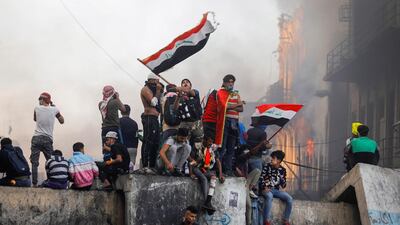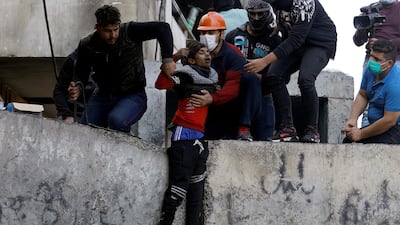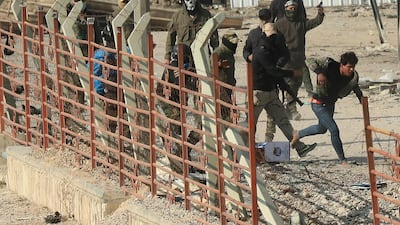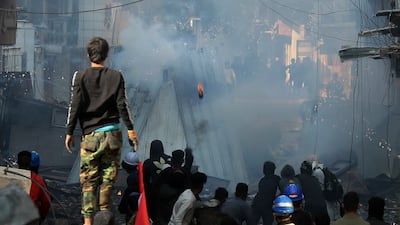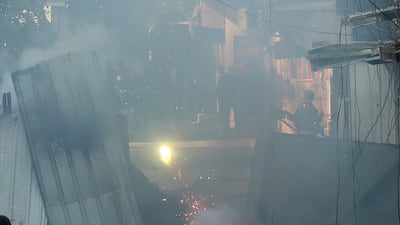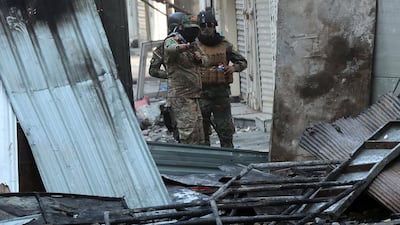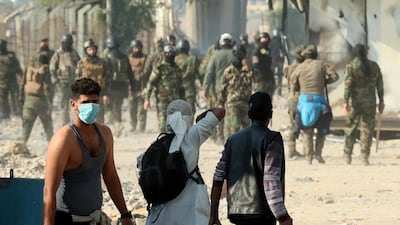Iraqi protesters set fire to the entrance of a shrine in the southern holy city of Najaf on Saturday and security forces fired tear gas to disperse them, risking more bloodshed after a rare day of calm.
The doorway to the Hakim shrine was set ablaze as protesters cheered and filmed it on their mobile phones.
The incident took place during one of the bloodiest weeks of Iraq’s anti-government unrest, which erupted last month. On Friday, Prime Minister Adel Abdul Mahdi promised to quit to try to stem the violence and public anger. Parliament met on Sunday and voted to strip powers from the prime minister.
Demonstrations continued elsewhere, including the southern city of Nassiriya where protesters earlier surrounded a police station and in Baghdad. But there were far fewer reports of casualties than on the previous two days, when scores were killed nationwide in the Iraqi capital and the south in clashes with security forces.
An Iraqi court on Sunday sentenced a police officer to death after convicting him of killing demonstrators, in the first such sentence in two months of deadly civil unrest.
The Kut criminal court sentenced the police major to be hanged and jailed a police lieutenant colonel for seven years for their roles in the deaths of seven protesters in the southern city on November 2, judicial sources said.
Mr Abdul Mahdi's announcement of his resignation came hours after a call from Iraq's top Shiite Muslim cleric for the government to step down to end the unrest. Wednesday’s burning of the Iranian consulate in Najaf, the seat of Iraq's influential Shiite clergy, only deepened the crisis.
The unrest, which has killed more than 400 people, mostly demonstrators, amounts to the biggest challenge for Iraq since ISIS insurgents seized vast swathes of Iraqi and Syrian territory in 2014.
It pits mostly young, disaffected Shiite protesters against a Shiite-dominated government backed by Iran and accused of squandering Iraq’s oil wealth while infrastructure and living standards deteriorate. Some anger has been directed at religious authorities which many protesters view as part of an out of touch ruling elite.
Security forces have used live ammunition, tear gas and stun grenades against protesters for nearly two months. Scores were killed in recent days, particularly in the southern cities of Nassiriya and Najaf as the death toll soars towards 400.
“This man was protesting holding an Iraqi flag and a flower. He was shot dead. He’s a sacrifice for the nation,” said a man attending a funeral procession for protesters killed this week in Najaf.
Pope Francis on Sunday criticised Iraq's crackdown on anti-government protests, saying "I am following the situation in Iraq with concern.
“It is with pain that I have learned of the protest demonstrations of the past days that were met with a harsh response, causing tens of victims," Pope Francis said at his weekly Sunday blessing and message.
Pope Francis, who has said he wants to visit Iraq next year, told tens of thousands of people in St Peter's Square that he was praying for the dead and wounded and invoking God for peace in the country.
Iraq’s cabinet approved Mr Abdul Mahdi’s resignation, his office said in a statement on Saturday, and parliament voted to accept it on Sunday.
“The government has done all it can to respond to the demands of protesters and enact reforms ... and calls the parliament to find solutions [to unrest] in its coming session,” the statement said.
Mr Abdul Mahdi’s government, including himself, will stay on in a caretaker capacity following the lawmakers’ vote until a new government can be chosen, the prime minister said later on Saturday in a televised cabinet meeting.
“This is a positive thing ... it show’s we’re no longer a dictatorship – governments do resign, and this is how authority is in democratic countries,” he said.
He added that President Barham Salih would then need to name a new premier for approval by parliament.
Iraqi protesters have welcomed the resignation but say it is not enough. They demand the overhaul of a political system they say is corrupt and keeps them in poverty and without opportunity.
Populist cleric Moqtada Al Sadr, who has supported the protests but has not thrown his full weight behind them, said late on Friday that demonstrations should continue and that the people should pick the next prime minister.
"The next candidate for prime minister should be chosen by popular referendum and picked from among five proposed candidates," Mr Sadr said in a statement on Twitter. He said protesters should meanwhile press their demands but reject violence.
The burning of the Iranian consulate in Najaf on Wednesday escalated unrest and led to Mr Abdul Mahdi’s resignation.
Nassiriya was the scene of the worst violence to hit war-weary Iraq since the anti-government protests began in Baghdad on October 1.
Many Iraqis fear violence will continue to escalate as angry families mourn dead relatives and the government moves slowly to enact only limited reform.
Weeks of political wrangling are expected before a successor to Mr Abdul Mahdi is picked and a new government formed.
Iraq's semi-official Human Rights Commission said on Saturday that those responsible for the killings of protesters must be brought to justice and that it would gather evidence for prosecution.
A statement issued by the commission did not acknowledge the prime minister's resignation.
The International Committee of the Red Cross urged a halt to rising casualties. "Firearms and live ammunition must only be used as a last resort," it said in a statement.
